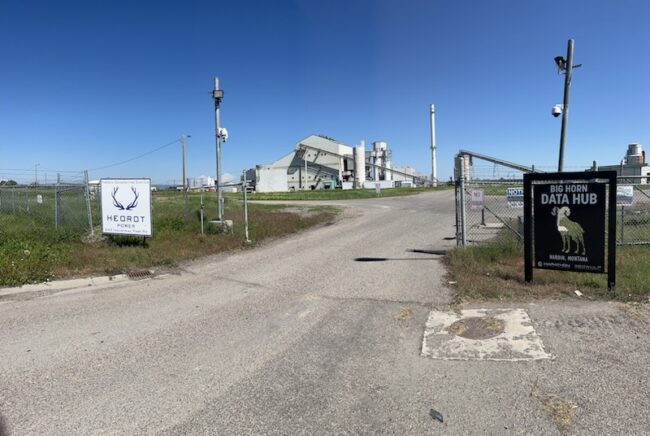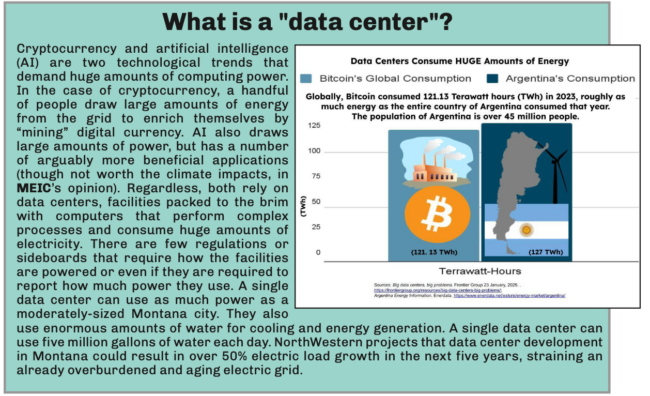
Big Horn Data Hub is a cryptocurrency “mining” facility that relies on enormous amounts of electricity generated from coal-fired power at the adjacent Hardin Generating Station.
Photo by Anne Hedges.
![]() By Anne Hedges and Ben Catton
By Anne Hedges and Ben Catton
NorthWestern Energy likes to overcharge customers for capital investments and upgrades to its infrastructure while it privatizes huge profits from ever-increasing rates. And now, it appears that NorthWestern is looking to cash in on the data center trend by discounting electricity costs to Big Tech while socializing the cost of adding them to the system, which will likely result in increased costs for residential and small business customers.
For the last five years, NorthWestern has been raising alarm bells about its desperate need for more electricity. It’s claimed that the Yellowstone County Generating Station (YGCS) was essential to keeping the lights on. Its fear-mongering was repeated by legislators, the Public Service Commission (PSC), and the Governor.
That desperate cry for more power generation evaporated overnight when NorthWestern announced in late January that it had so much excess power that it could provide a number of data centers with 400 megawatts of power in the next few years. NorthWestern made the unsubstantiated (and frankly, bonkers) claim that adding this much demand would lower residential customers’ utility bills. Keep in mind that NorthWestern’s current customers require 750 average megawatts per year. Adding 400 megawatts of demand to NorthWestern’s system in order to provide power to tech giants like Meta, Google, and Amazon to power their data centers seems like it needs a lot more scrutiny. At the very least, the public needs to be protected from NorthWestern’s inherent desire to shift costs to existing small customers.
The Scheme
A recent Harvard study described this new grift pushed by utilities across the country. “Extracting Profits from the Public: How Utility Ratepayers Are Paying for Big Tech’s Power” warns that utilities are able to hide the costs of these data centers when they go before utility commissions and are able to shift “Big Tech’s energy costs to the public.” The report provides insight into NorthWestern’s newest ploy to bring big data centers to the state in order to bolster its profits while charging customers for new infrastructure and generation these data centers demand, all while saying these data centers will mysteriously benefit small customers.
The truth is that monopoly utilities like NorthWestern Energy are incentivized to pursue growth for growth’s sake, because they are guaranteed a rate of returned profit on new infrastructure investments (in NorthWestern’s case, it’s a return on equity of 9.64% to a proposed 10.8% for the YCGS). That means building new infrastructure to accommodate data centers is extremely attractive to utilities – and should be equally alarming to everyday ratepayers. Unfortunately, these projects don’t provide universal benefits; they generally serve billionaire tech companies. Nonetheless, in partnering with utilities, tech companies can shift costs onto captive customers who rely on consumer protections that may not be living up to these challenges.
Data center operators and big tech companies are shopping for cheap energy directly with utilities. According to the Harvard study, it is predicted that data centers may consume as much as 12% of all U.S. electricity by 2030 and could be responsible for quintupling the annual growth in electricity demand. With such a lucrative new market on the horizon, utilities are scoring below-market rates through special contracts between the data center and the utility with terms that are not publicly available, severely disadvantaging other ratepayers. Some utilities are even entering into deals to locate the data center behind the meter of the generating station and then arguing that they shouldn’t bear any costs of transmission even though they remain connected to the grid.
At the Legislature
To address this issue and get ahead of any shenanigans, MEIC worked on HB 263 (Rep. Katie Sullivan, D-Missoula) that would have required data centers in Montana to annually report their energy use and to predict their energy needs for the coming year. It would be helpful to know what data center demand is on the electric system. Despite no opponents and support from current and former PSC Commissioners, the House Energy, Technology, and Federal Relations committee tabled the bill.
Shortly after the hearing, the PSC unanimously voted to send a letter to NorthWestern asking it to justify its position that it can provide such a large amount of electricity to data centers and not impact existing customers and to answer why NorthWestern wasn’t coming to the PSC for approval. NorthWestern’s response was reminiscent of the Wizard of Oz: “Ignore the man behind the curtain.” As expected, NorthWestern claimed the PSC has no role in its decision to serve these large and mysterious data centers. MEIC filed comments with the PSC critiquing NorthWestern’s analysis and pointing out the legal obligation for the PSC to review such large additions to the system.
On the other side of the coin, HB 424 (Rep. Katie Zolnikov, R-Billings) seeks to give a massive property tax cut to generation facilities operating on-site of any data center. While MEIC supports encouraging these data centers to build their own generation, we are in strong opposition to a provision that provides an 85% tax cut for the Hardin coal plant. As of this writing, the bill is awaiting a vote in the House.
The PSC is unclear about what happens next for data centers, but did refer in the press to a potential next step being a meeting between the PSC and NorthWestern’s legal teams. One thing is certain: the PSC must protect us from NorthWestern’s insatiable quest to generate revenue to compensate for its sagging stock value. If the PSC won’t, who can?

This article was published in the March 2025 issue of Down To Earth.

